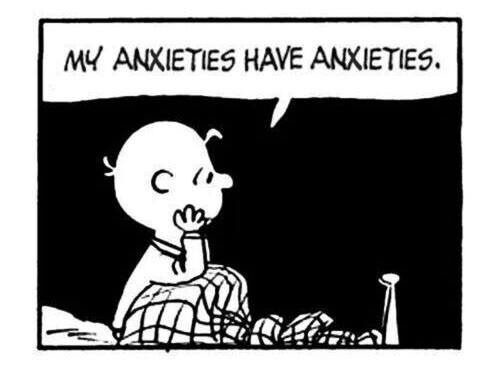Photo © RoseFireRising | Flickr / Creative Commons [image: Mandala made out of different colored and shaped pills, on a dark blue background.] Kit Mead kpagination.wordpress.com [Note: This post discusses anxiety, medications, and chemical restraints. It is meant to caution against overmedication and about risk factors in medication for autistic people, with the understanding that many autistic people rely on psychiatric medication for their health and well-being.] I would need more than two hands to count the psych meds I’ve been given. There are enough that I don’t remember all of them; it started in the first grade. Some were just regular ADHD meds—which I needed—not psychotropic. As years passed, others were anti-anxiety SSRIs, and then antipsychotics; many well before I’d hit the end of middle school (these include Risperdal, Paxil, and Wellbutrin). While I was not diagnosed autistic until I was 14 or 15, the logic under which these…
Tag: anxiety
Photo © Mariana Zanatta | Flickr/Creative Commons [image: Hand-drawn black-and-white outlined block letters spelling “anxiety” on a background of “anxiety” written repeatedly in black & filling all space.] Christine Motokane www.workingthedoubleshift.com It is well known that individuals on the autism spectrum are likely to have co-occurring mental health issues such as depression and anxiety. However, mental health is a less-discussed topic surrounding autism, compared to behavior and social challenges, etc. As an autistic young adult with anxiety, I can give personal insight on this high prevalence. A big part of our susceptibility to issues like anxiety has to do with how we were slowly socialized, either implicitly or explicitly, to believe that an autistic lifestyle is something that is defective and therefore needs fixing. A recent Independent article sums up the strong link between lack of autism acceptance and the development of mental health disorders in autistic people: Research shows that lack…
Autism is so much a part of who your child is that many of us Autistic adults who are able to communicate, and who choose to talk about being Autistic, will tell you that it hurts us to hear or read phrases like “fight autism,” because it feels like people want to fight us.
How many anxious people are not getting helped because access to mental health services is blocked by the lack of accommodation for the very issue that brings them seeking services in the first place?
Crystal Garrett Snoopy Souce: www.peanuts.com [image: the cartoon dog Snoopy, doing the “Snoopy Dance.”] Zachary’s laughter has been called infectious. One specialist even opined it sounded much like Charles Schultz’s famous character, Snoopy. Those breath-taking sounds of pure joy that burst forth from deep inside his belly are a special treat these days. Zachary doesn’t laugh much anymore. There’s a reason my six-year-old’s giggles have been replaced by meltdowns. And his story deserves to be told because he is not alone: There are many traumatized autistic children just like him—their stories must be heard, too. And if we have any compassion, we must listen to them. This is Zachary’s story. It was only the third day of first grade — Aug. 26, 2015 — that my child was involuntarily committed to a hospital more than two hours from my home. Zachary had not been properly diagnosed yet, but we would…
TPGA is observing Autism Acceptance Month by featuring accounts from autistic people about the differences accommodations (or lack thereof) make in their lives. Today, John Elder Robison talks about why accommodation is important, yet may not be enough to help autistic people like him with co-occuring conditions such as anxiety. John Elder Robison jerobison.blogspot.com With April being Autism month, the folks at TPGA asked me to write about accommodations. How about anxiety, Shannon asked? Foolishly, I agreed. After thinking about the topic for hours, till smoke dribbled from my ears, I cannot conceive of any accommodation I could request around my anxiety. Photo © John Elder Robison [Image: Close up of water running over a rock in a stream.] For me, anxiety is one of the most disabling aspects of autism, and it’s with me — at least at a low level — most all the time. I am almost…
TPGA is observing Autism Acceptance Month by featuring accounts from autistic people about the differences accommodations (or lack thereof) make in their lives. Today’s story is from Savannah Logsdon-Breakstone, about getting comfortable with asking for crucial accommodations — and setting one’s own boundaries about those supports. Savannah Logsdon-Breakstone crackedmirrorinshalott.wordpress.com When I first moved out, we didn’t realize that I needed the support that I do. I’ve talked about some of these things before on this blog, so I’m going to give each of them a paragraph. I understand general concepts around money management, but am unable to consistently apply it to my own life. (Example: I might need something but not get it, because I’m worried I won’t have enough money, even though it’s what the money is supposed to be there for.) Additionally, I have executive functioning issues that mean that making sure the right things happen at the right time…
I bring a bag of things to do—a book, a journal and pen, a music player and headphones—for when I need to chill out. If I get too overwhelmed, I take a walk in the cold air. When I take enough breaks to disengage, I can enjoy spending time together with large groups of relatives!
arbitrary I took both of my children to the park the other day. It shouldn’t be some sort of big announcement that a mom takes her kids to the park, but I was by myself with my two children, who have very different, needs, wants, and abilities, and I am a chicken. There. I said it. I am a scaredy-cat when it comes to taking my kids out into open, uncontrolled situations by myself, unless Jack is buckled into his wheelchair. He has escaped my grasp so many times, wrenching my shoulder as he goes; there are dangerous situations around every corner, and he is fast. And as mature and amazing Katie is at 5, she really is still a small child who deserves to be looked after on a busy street, or a park… but it is summer, and my children are convincing, so I took them. Katie providing…
David M. Davison fightingforhope.wordpress.com Imagine needing order in a disorderly world. Imagine creating order, and being laughed at for doing so. Imagine needing precision in an imprecise world. Imagine being precise, and being told it is often unnecessary. Imagine needing structure in an unstructured world. Imagine creating structure, only for people to tear it apart. Imagine needing words to have their literal meaning. Imagine taking words literally, only for people to consider you stupid. —- Imagine order is innate, and you have to work out when order is not required. Imagine precision is innate, and you have to work out when precision is not required. Imagine structure is innate, and you have to work out when structure is not required. Imagine taking words literally is innate, and you have to work out when the meaning is not literal. —- Imagine becoming anxious when you see the ‘Random’ button on your…







